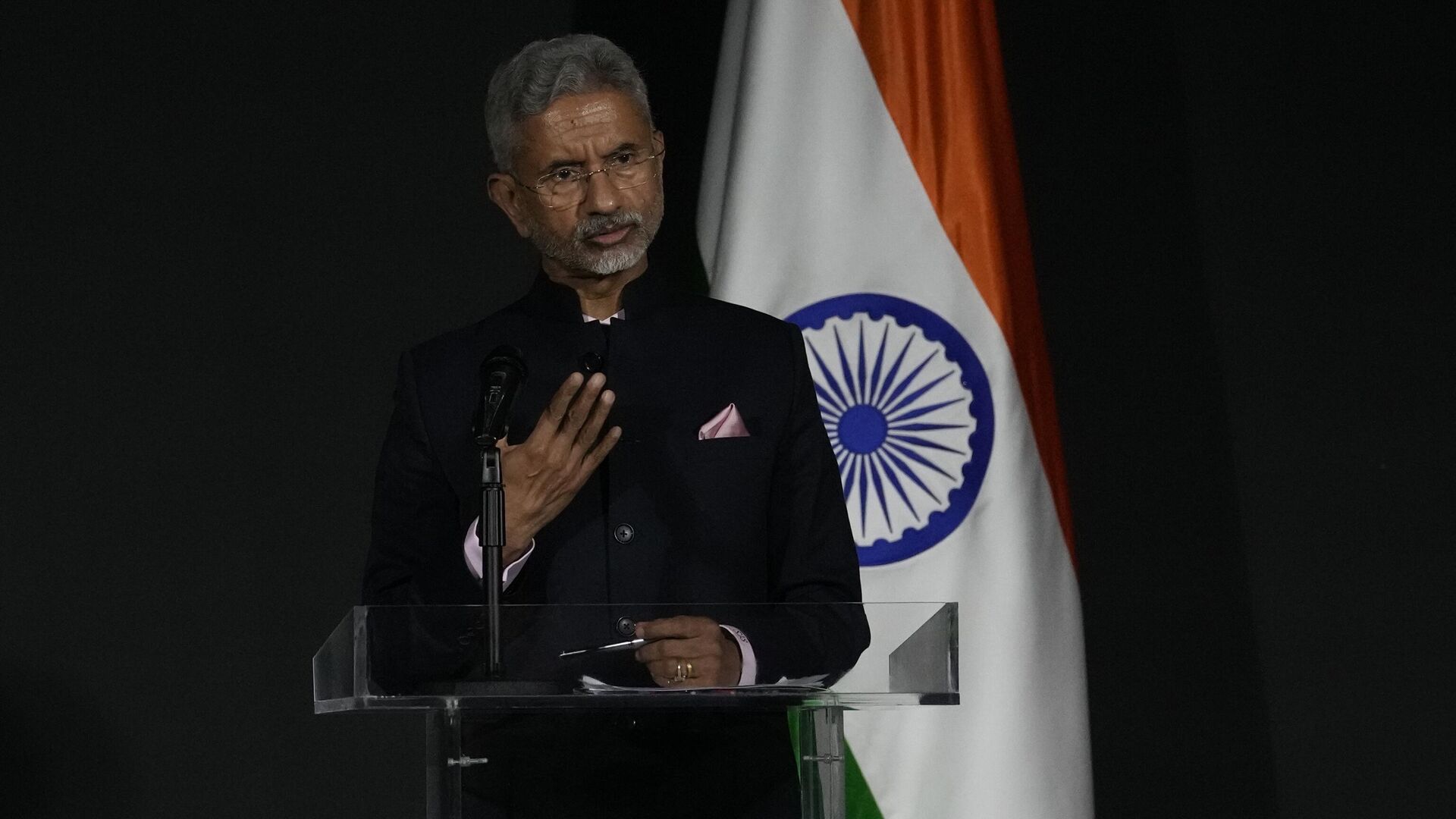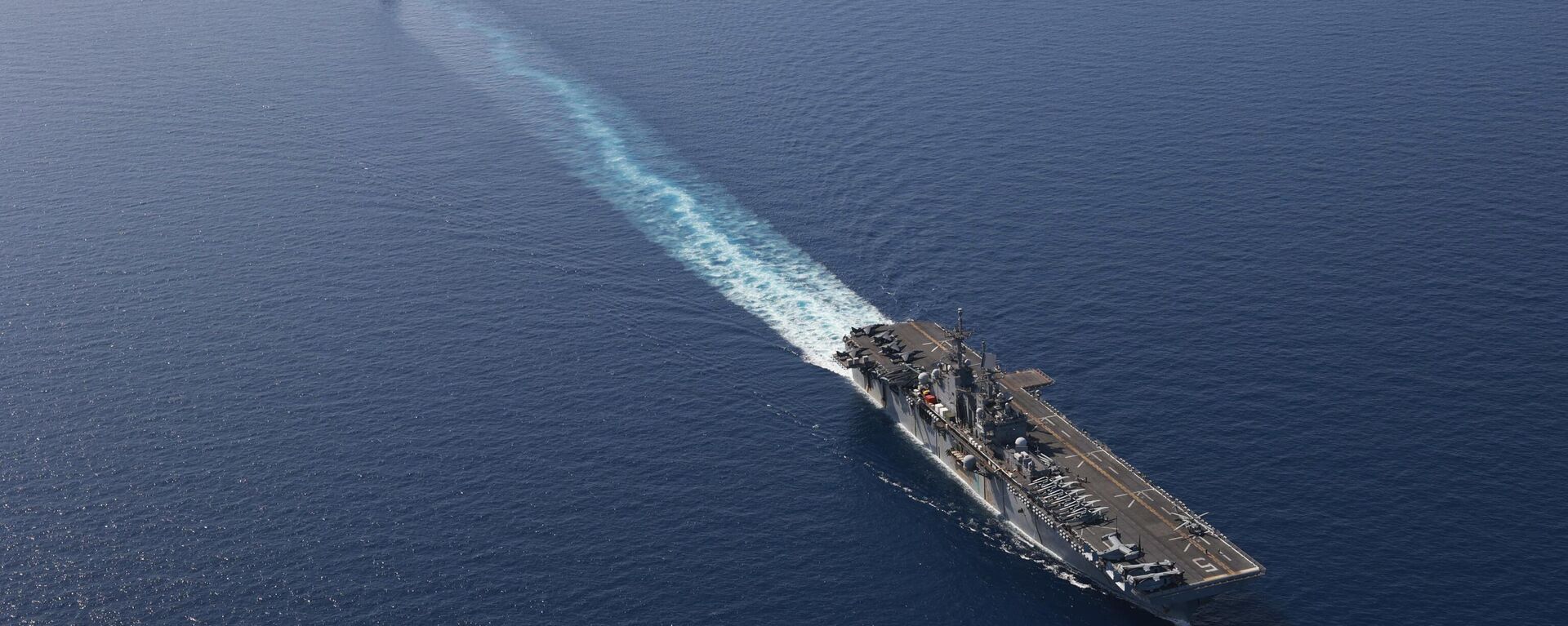https://sputniknews.in/20240115/india-iran-dialogue-could-bharat-become-a-mediator-in-middle-east-crises-6216051.html
India-Iran Dialogue: Could Bharat Become a Mediator in Middle East Crises?
India-Iran Dialogue: Could Bharat Become a Mediator in Middle East Crises?
Sputnik India
Amid the Red Sea crisis, India's External Affairs Ministry is holding bilateral discussions in Iran. Sputnik India looks into the Iran-India meeting as a signal of India's growing significance in the Middle East.
2024-01-15T20:47+0530
2024-01-15T20:47+0530
2024-01-15T20:53+0530
s. jaishankar
india
iran
middle east
ministry of external affairs (mea)
x (former twitter)
us
terrorism
indo-pacific
military equipment
https://cdn1.img.sputniknews.in/img/07e8/01/0f/6205839_0:160:3073:1888_1920x0_80_0_0_43a69a06585f7de48501d958f8a208e8.jpg
Indian External Affairs Minister S Jaishankar's trip to Tehran coincides with escalating global problems, including ongoing Israeli assault on the Palestinian Gaza Strip and Yemen's targeting of Israeli vessels in the Red Sea.Jaishankar began his visits to Iran on Monday by meeting with Minister of Roads and Urban Development Mehrdad Bazrpash. They had a 'productive' dialogue on creating a long-term framework for cooperation regarding the strategically significant port of Chabahar.The two ministers will also discuss bilateral, regional, and international issues, according to the Ministry of External Affairs (MEA).Chabahar Port: India's Strategic Gateway for Seamless Communication and LogisticsIran occupies a distinctive place in the complex network of global alliances, marked by a lack of allies both regionally and internationally, Vice Admiral AK Chawla, Distinguished Fellow at United Service Institution of India, told Sputnik India.He noted, however, that Iran continues to be a crucial country, blessed with a rich society and abundant natural resources."Its strategic location at the mouth of the Persian Gulf only adds to its significance, making it a linchpin in the geopolitical landscape” Chawla said.Chawla pointed out that “the freedom of navigation on the high seas is a shared interest, extending its benefits to all, including Iran. The critical passage of trade and goods through the Persian and Red Seas has positioned India as a key player in the Middle East.”Diplomatic Leverage: India's Pivotal Role in Advancing Middle East Peace InitiativesIndia could play a significant role in the Middle East by using its diplomatic capabilities to promote an end to the conflict in Gaza, Hassan Beheshtipour, a Political Analyst at the Institute for Iran-Eurasia Studies (IRAS), told Sputnik India.He emphasized the importance of persuading Israel to stop its actions. The analyst also pointed out that while major powers such as the United States and the UK have not successfully influenced Israel, there are doubts about Iran's capability to pressure Palestine, the oppressed party, into compliance.“Functioning as an impartial mediator, India assumes the role of an honest broker who can actively foster dialogue between the Middle East and other nations. Recognizing the interconnectedness of national, regional, and global economies, the secure movement of commodities and people in this strategic maritime corridor becomes not merely a logistical necessity but a linchpin supporting the prosperity of nations on a broader scale,” Chawla noted.
https://sputniknews.in/20240112/what-are-ramifications-of-us-and-allies-houthi-strikes-6183756.html
india
iran
middle east
us
indo-pacific
new delhi
israel
palestine
red sea
Sputnik India
feedback.hindi@sputniknews.com
+74956456601
MIA „Rossiya Segodnya“
2024
Swapna Nair
https://cdn1.img.sputniknews.in/img/07e7/09/12/4320104_0:0:681:681_100x100_80_0_0_ca8a7d4d582609272840ffdd1cde7278.jpg
Swapna Nair
https://cdn1.img.sputniknews.in/img/07e7/09/12/4320104_0:0:681:681_100x100_80_0_0_ca8a7d4d582609272840ffdd1cde7278.jpg
News
en_IN
Sputnik India
feedback.hindi@sputniknews.com
+74956456601
MIA „Rossiya Segodnya“
Sputnik India
feedback.hindi@sputniknews.com
+74956456601
MIA „Rossiya Segodnya“
Swapna Nair
https://cdn1.img.sputniknews.in/img/07e7/09/12/4320104_0:0:681:681_100x100_80_0_0_ca8a7d4d582609272840ffdd1cde7278.jpg
indian external affairs minister, s jaishankar, iran, minister of roads and urban development, mehrdad bazrpash, dialogue, long-term framework for cooperation, strategically, chabahar port, bilateral, regional, international issues, tehran, long-term cooperation framework, chabahar port, international north-south transport corridor, israel-hamas war, houthi terrorists, merchant vessels, red sea, jaishankar's, tehran, global concerns, international community, persian gulf, geopolitical landscape, vice admiral ak chawla, distinguished fellow, united service institution of india, trade and essential supplies, central asia, afghanistan, turkmenistan, and uzbekistan, strategic significance, communication and logistics, chabahar port, freedom of navigation, high seas, persian and red seas, middle east, united states, uk, israel, conflicts, middle east, foster dialogue, middle east
indian external affairs minister, s jaishankar, iran, minister of roads and urban development, mehrdad bazrpash, dialogue, long-term framework for cooperation, strategically, chabahar port, bilateral, regional, international issues, tehran, long-term cooperation framework, chabahar port, international north-south transport corridor, israel-hamas war, houthi terrorists, merchant vessels, red sea, jaishankar's, tehran, global concerns, international community, persian gulf, geopolitical landscape, vice admiral ak chawla, distinguished fellow, united service institution of india, trade and essential supplies, central asia, afghanistan, turkmenistan, and uzbekistan, strategic significance, communication and logistics, chabahar port, freedom of navigation, high seas, persian and red seas, middle east, united states, uk, israel, conflicts, middle east, foster dialogue, middle east
India-Iran Dialogue: Could Bharat Become a Mediator in Middle East Crises?
20:47 15.01.2024 (Updated: 20:53 15.01.2024) Amid the Red Sea crisis, India's External Affairs Ministry is holding bilateral discussions in Iran. Sputnik India looks into the Iran-India meeting as a signal of India's growing significance in the Middle East.
Indian External Affairs Minister S Jaishankar's trip to Tehran coincides with escalating global problems, including ongoing Israeli assault on the Palestinian Gaza Strip and Yemen's targeting of Israeli vessels in the Red Sea.
Jaishankar began his visits to Iran on Monday by meeting with Minister of Roads and Urban Development Mehrdad Bazrpash.
They had a 'productive' dialogue on creating a long-term framework for cooperation regarding the strategically significant port of Chabahar.
The two ministers will also discuss bilateral, regional, and international issues, according to the Ministry of External Affairs (MEA).
"Began my engagements in Tehran by meeting Minister of Roads and Urban Development Mehrdad Bazrpash. Detailed and productive discussion on establishing a long-term cooperation framework concerning Chabahar port. Also exchanged views on the International North-South Transport Corridor," Jaishankar tweeted.
Chabahar Port: India's Strategic Gateway for Seamless Communication and Logistics
Iran occupies a distinctive place in the
complex network of global alliances, marked by a lack of allies both regionally and internationally,
Vice Admiral AK Chawla, Distinguished Fellow at United Service Institution of India, told Sputnik India.
He noted, however, that Iran continues to be a crucial country, blessed with a rich society and abundant natural resources.
"Its strategic location at the mouth of the Persian Gulf only adds to its significance, making it a linchpin in the geopolitical landscape” Chawla said.
Illustrating its pivotal role, the Admiral stated that the “distribution stands as a crucial nexus for facilitating trade and essential supplies from the landlocked nations of Central Asia, including Afghanistan, Turkmenistan, and Uzbekistan. Recognizing the strategic significance of maintaining smooth communication and logistics, India has been actively pursuing facilitation through the Chabahar port.”
Chawla pointed out that “the
freedom of navigation on the high seas is a
shared interest, extending its benefits to all, including Iran. The critical passage of trade and goods through the
Persian and Red Seas has positioned India as a key player in the Middle East.”
Diplomatic Leverage: India's Pivotal Role in Advancing Middle East Peace Initiatives
India could play a significant role in the Middle East by using its diplomatic capabilities to promote an end to the conflict in Gaza, Hassan Beheshtipour, a Political Analyst at the Institute for Iran-Eurasia Studies (IRAS), told Sputnik India.
He emphasized the importance of persuading Israel to stop its actions.
The analyst also pointed out that while major powers such as the United States and the UK have not successfully influenced Israel, there are doubts about Iran's capability to pressure Palestine, the oppressed party, into compliance.
"It becomes imperative for India to use its diplomatic channels to contribute towards ending conflicts, thereby positioning itself as a potential player in shaping the future stages of peace in the Middle East,” Beheshtipour said.
“Functioning as an impartial mediator, India assumes the role of an honest broker who can actively
foster dialogue between the Middle East and other nations. Recognizing the interconnectedness of national, regional, and global economies, the secure movement of commodities and people in this strategic maritime corridor becomes not merely a logistical necessity but a linchpin supporting the prosperity of nations on a broader scale,” Chawla noted.



